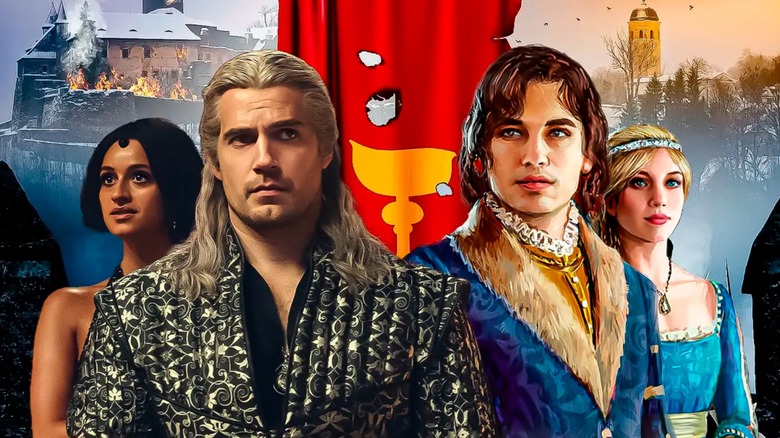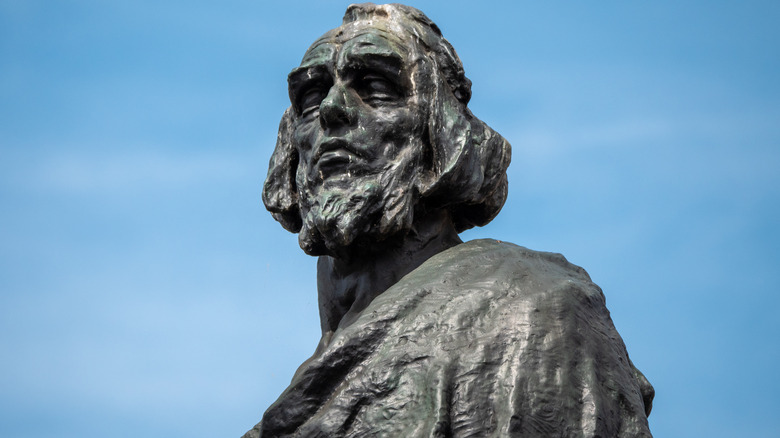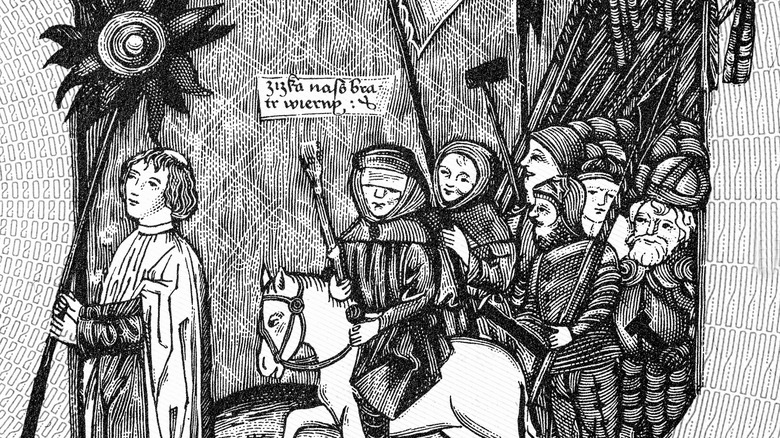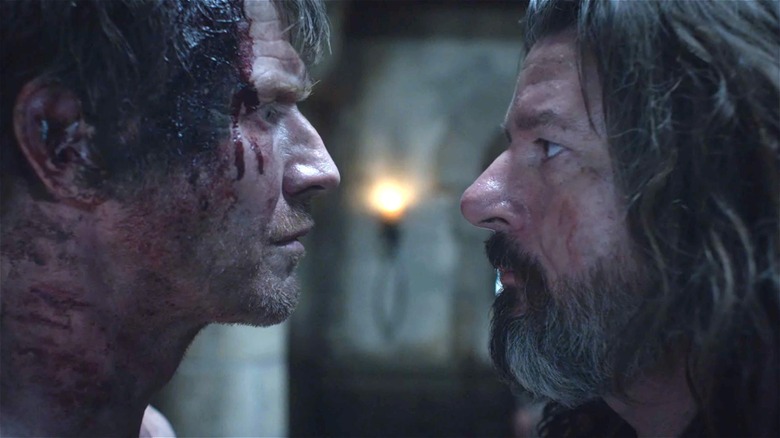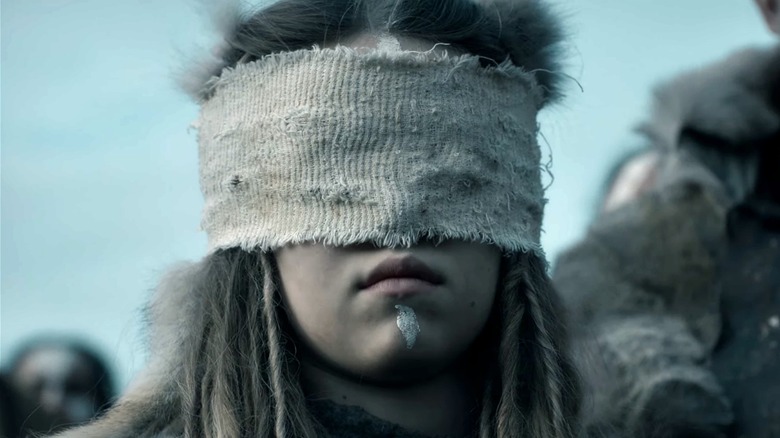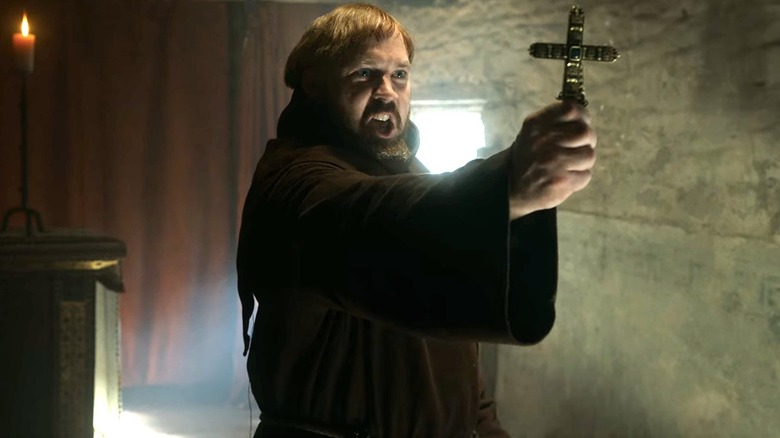The Witcher Author's Hussite Trilogy Is The Elixir High Fantasy TV Desperately Needs
In the spring of 2020, nearly two decades after its initial publication, Andrzej Sapkowski's "The Tower of Fools" finally received an English translation and publication. Books 2 and 3, "Warriors of God" and "Light Perpetual," soon followed, and though it's nearly impossible to stumble across U.S. marketing for the Hussite Trilogy that doesn't mention Sapkowski's "The Witcher" series, one needn't have any affection for or familiarity with the latter to appreciate the strength, adaptation potential, and simultaneously timeless and timely relevance of the author's adventures in 15th-century Bohemia.
Sapkowski himself, in fact, considers the Hussite Trilogy to be his most successful work, and given the seamlessness with which the series blends fantasy, philosophy, moral inquiry, literary tradition, and no small amount of humor with extensively researched and richly depicted historical settings and events, it's easy to see why. Over the course of three novels, we follow the perpetually lovestruck and naive Reynevan as he and his unlikely companions traverse the 15th-century lands of Bohemia and find themselves unwittingly caught up in cultural, national, and religious warfare.
Like so many historical fiction narratives, the series' backdrop is as important as the journey of its central characters, who serve as our proxies in a strange and dangerous setting. Unlike so many historical fiction narratives, the Hussite Trilogy explores and takes meaning from an underused time and place and balances its devastation and destruction with fantasy and humor that not only enhance the story but also make it an even more accessible and poignant commentary on the present as little more than the most recent iteration of the past. Because of this, there's no time like the present to bring a little Sapkowski-spun reality to fantasy TV.
The Hussite Wars are a fresh (old) subject
Andrzej Sapkowski drops his characters into the first half of the 15th century — one of the most pivotal, complex, violent, and revolutionary times in the Middle Ages. In England, a warrior prince took the throne and went on to defeat the French at Agincourt; in France, a young peasant girl spoke to God and the saints, saw her dauphin crowned king, spurred French soldiers to victory, and was tried and burned as a heretic; in Germany, a goldsmith made our modern world possible by using his newfangled instrument to print a book many couldn't yet read but that held sway over every aspect of their lives; and in China, Emperor Zhu Di kicked off an era of Chinese exploration years before the Western world set off on a similar path.
But while even the less historically inclined could tell you something about the importance and impact of Henry V, Joan of Arc, Johannes Gutenberg's printing press, and the Ming dynasty, Sapkowski's early 15th-century subject matter remains under-explored by most of the Western world. "People from my part of Europe don't know much about the Hussite Wars either," the author said in an interview for SciFiNow. "It's precisely because the Hussite Wars hadn't been overused that inspired me to take them up." That important episode is ripe for adaptation not only because it's been woefully overlooked by film and television but also because the themes and theses Sapkowski draws from it are, in 2023, as relevant as ever.
Okay, but what were the Hussite Wars?
The Hussite Wars pitted Pope Martin V, Holy Roman Emperor-elect Sigismund of Luxemburg, and the Catholic-aligned states of Europe against the followers of religious reformer and theologian Jan Hus. A full 100 years before Martin Luther's "Ninety-five Theses," Hus challenged the corruption of the establishment, thus posing a threat to the absolute power of the Roman Catholic Church. After being lured by Sigismund under false pretenses to the Council of Constance, Hus was burned as a heretic in 1415. To the surprise of absolutely no one, this only served to make him a martyr, and his followers, the Hussites, rose up in short order.
When the Bohemian king Wenceslaus IV died, his half brother, Sigismund, became King of Bohemia, after which Martin V ordered several crusades against the Hussites. Given the numbers — the majority of Catholic Europe against a single faction that was itself divided into warring moderate and radical factions — they should have been easily squashed. They weren't, in large part thanks to the leadership of military strategist Jan Žižka. Žižka's use of portable and uniformly produced wagon forts allowed small numbers of untrained peasants to hold off large armies of professional cavalry using a previously rarely utilized technology: firearms. Thus, the Hussite Wars didn't just bring us the first sparks of what would become the Protestant Reformation — they also left the Western world with a new way to wage war.
This is, of course, a too-brief summation of an extraordinarily complex conflict. In his Hussite Trilogy, Andrzej Sapkowski leans into that complexity with a characteristically casual, wry detachment that underscores the absurdity, tragedy, futility, naivete, desperation, and savagery of fanaticism.
And what could they teach us?
The Hussite Wars were rife with alternating allegiances, internal conflict, and various factions, each of which pops up in several ways in Andrzej Sapkowski's Hussite Trilogy and impact the morality, circumstance, and fate of his main characters. Crucially, all this chaos took place in the Age of Faith, when belief was truth and anyone who didn't believe what you believed about God posed a threat to both humanity and your own salvation.
When it came to "getting God right," the stakes couldn't be higher — religious conflict in Christian Europe was a fight against the devil and for your soul, and the fact that your opponent felt exactly the same way about you only further proved their heresy. In short, all parties believed that God was on their side and their side alone, a logistical impossibility that Sapkowski foregrounds in ways both subtle and humorous, violent and devastating.
It's difficult for the modern mind to grasp the all-encompassing nature of religion — in all its varied and warring forms — in the medieval world, but that doesn't mean it's not without a contemporary, analogous counterpart. Religion impacted every aspect of one's daily life, including political and cultural allegiances. And in times of crisis (e.g., following the Great Famine and the Black Death in the 14th century), a tool ostensibly meant to guide, teach, comfort, unite, and improve society quickly became a weapon — one used by those either in or seeking power to control, manipulate, and divide a vulnerable population who, in turn, used that weapon on one another. In other words, religion in the medieval world is essentially the Internet in 2023.
Cool, but do we need another historical fiction adaptation?
Like all the best historical fiction and fantasy, the Hussite Trilogy refuses to glorify, gloss over, or ignore the brutality of its subject matter. As Publisher's Weekly's review of "Light Perpetual" reads, "Removing any romanticizing lens on his vast cast's heroics, [Andrzej Sapkowski] spares neither the guilty nor the innocent—nor fan[-]favorite characters—as all sides compromise to reduce the fires of fanaticism." It's an approach that not only makes for more nuanced and compelling storytelling, but also, in light of the increasing attacks on historical awareness in U.S. schools, makes that storytelling as urgent as ever.
Historical fiction, particularly the kind that allows us to actually use the hindsight that centuries of social evolution have granted us (as Sapkowski's Hussite Trilogy inarguably does), doesn't just provide us with an exciting romp through the settings, fashions, and mindsets of yore. As New York Times journalist Megan O'Grady notes, "It's also a form of resistance." Like the contemporary authors she mentions, Sapkowski endeavors "not to hand us answers but to capture the way history shapes, wounds and implicates us."
This is, perhaps, what truly sets the genre apart: Historical narratives can compel us to think critically about the ideological conflicts, moral and social dilemmas, and nature of human behavior depicted and revealed therein. Relevantly, Sapkowski's Hussite Trilogy balances this kind of sobering but necessary self-reflection with a psychologically revealing use of mythology, fantasy, and literary tradition.
Historical fantasy allows us to explore, and exorcise, our demons
Instead of thinking of Andrzej Sapkowski's injection of fantasy in history as, for instance, a "The Tudors"-meets-"The Witcher" hybrid, it's best to think of it like Robert Eggers' "The Witch" or "The Northman." In these stories, the fantastical is "real" only because we are seeing the world through the eyes of a society that believes it is. And in the 15th century, belief in magic, witches, werewolves, and curses was commonplace. "The Church always condemned magic," Voltaire wrote, "but she always believed in it: she did not excommunicate sorcerers as madmen who were mistaken, but as men who were really in communication with the devil" (p. 297, "Voltaire's Philosophical Dictionary"). All these various superstitions and creatures appear along our intrepid heroes' journey, though Sapkowski subverts and employs them to call out humanity's fears, anxieties, and bigotries.
For instance, according to an article published in the scientific journal "EMBO Reports" in 2016, "During the Middle Ages, mental illness was regarded as a punishment from God: sufferers were thought to be possessed by the devil." In "The Tower of Fools," a mentally disabled parishioner is indeed possessed by a "demon" supposedly called forth during an exorcism, but it's just as likely he's simply an outlaw who was feigning his disability in order to hide and whose newfound capacity for Latin and a variety of other languages is simply something he possessed all along.
Regardless, the implication is clear: The Church's thoughts on disability — as well as the mind, mental health, and sanity — were the result of fear, not reason. And our modern-day stigmas and hang-ups are no different.
The Hussite Trilogy lends itself to adaptation
Speaking of hang-ups, if you're among the "Witcher" fans finding Season 3 lacking in comparison to previous seasons, there's little to fear here with regard to an adaptation of the Hussite Trilogy. Though both series are brimming with Andrzej Sapkowski's classic tongue-in-cheek, between-the-lines commentary on his subject, the mechanics of Geralt, Ciri, and Yennefer's narrative rely on a far more complex system of information delivery than that of Reynevan, Scharley, Samson, and Nicolette.
For starters, the former's invented world requires that a great deal of information come to us in summation or via references to past events (making a chronological depiction difficult unless one inserts piles of voice-overs, clunky explanatory dialogue, and context-providing text and epigraphs), whereas 15th-century Bohemia, Silesia, and Hungary are all real places. What's more, while both series wrestle with the notion of "truth" — and the power of blind belief in a given version of it — by asking us to consider the source, they rely on different techniques.
In "The Witcher," if we're reading in-scene omniscient narration or brought inside a flashback, we can more or less trust its veracity. However, if the information is being relayed through an intermediary source, we're always vaguely aware that it could, at any point, prove inaccurate, whether it's an intentional misrepresentation, an inherently biased one, or simply a misinterpretation of reality. Although this is equally true of the Hussite Trilogy, we know the truth about this world and its affairs because it's set in real-world history, we rely little on long summations or references to past events, and our narrator's thoughts on any given character, bit of dialogue, event, or belief are overt — and heavy with necessary information and subtext.
If nothing else, do it for the laughs
Our story begins, for instance, with a comedic sex scene intercut by monks in the nearby priory starting their hymns for the sext — as in "the fourth of the seven canonical hours of the divine office or the prayers prescribed for it: originally the sixth hour of the day (noon)." Our sexually naive hero and lover Reynevan — who, as our narrator reveals, "regarded himself as a great seducer and erotic connoisseur to whom the female race was an open book" (p. 14, "The Tower of Fools") — is having his own bout of religious ecstasy with, as it so happens, a married woman. It isn't the first time, and won't be the last, that the series underscores its thoughts on the absurdity of humans — and our beliefs, assumptions, behaviors, and rituals — by subverting the supposedly sacrosanct.
But it isn't just religious doctrine and dogma that finds itself on the receiving end of Andrzej Sapkowski's sardonic wit. Literary traditions — most notably, medieval romances — are upended and examined as well. Reynevan may be the story's Lancelot, but he's far from the physically adroit, stereotypically virile paragon of courtly love so precious to Arthurian literature. As a physician, intellect, and practitioner of magic, Reynevan is certainly no slouch, but his constant inability to realistically read the situation, his starry-eyed underestimation of every woman he falls for, and his self-righteousness and staunch morality result in a leading man who falls somewhere between the pathetically pure Perceval and Ben Feldman's endearing but occasionally insufferable Cloud 9 associate Jonah. We root for him, of course, but we're as likely to laugh at or want to shake him as we are to swoon over or want to imitate him. And this is partially the point.
... and the power of perspective
None of this humor prevents the Hussite Trilogy from engaging in the kind of serious and meaningful investigation its subject matter warrants. In fact, by highlighting the irrationality and foolishness of our species, Andrzej Sapkowski only enhances his readers' potential to take a step back and see the stories we tell ourselves — not just about who we are but about who "others" are as well — for exactly what they are: stories. And the capacity to see our own shortcomings, question our own truths, and recognize that the sort of zealous, blind faith that led to so much death and destruction in the Middle Ages is as alive and well as ever is an ability we really can't afford to let atrophy.
Sapkowski's 2020 SciFiNow interviewer referenced the Hussite Trilogy's relevance to current events, and over the course of the past three years, the author's response has only become more significant. "It appears that I've either got prophetic gifts or this bloody world changes very little," he replied. "Our world is like a rotten actor – it plays the same role over and over; it just changes costumes." Maybe Sapkowski really does have prophetic gifts, but the alternative feels far more likely and is as good a reason as any to bring the Hussite Trilogy — and its examination of that alternative — to an even wider audience.
